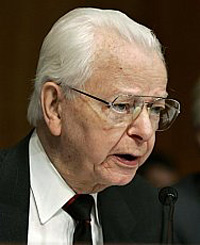 |
 |
 |
 News from Around the Americas | March 2006 News from Around the Americas | March 2006  
Patriot Act Renewal Clears Final Hurdle
 Laurie Kellman - Associated Press Laurie Kellman - Associated Press


| | Sen. Robert Byrd, D-W.Va. takes part in a hearing of the Senate Armed Services Committee on Capitol Hill in this Feb. 7, 2006 file photo. Byrd, the dean of the Senate and its resident constitutional expert, counts only a few regrets in his 48-year Senate career: filibustering the 1964 Civil Rights Act, voting to expand the Vietnam War, deregulating airlines. Add to the list a new one from this century: supporting the anti-terror USA Patriot Act after the Sept. 11, 2001, attacks. (AP Photo/J. Scott Applewhite, Files) |
Washington - The USA Patriot Act renewal is heading for Senate approval even as lawmakers continue to squabble over whether it has enough curbs on government power in terror investigations.

Senate Democrats say Republicans have allowed the Bush administration to dictate the finished product.

"No one has the right to turn this body into a rubber stamp," said Sen. Russell Feingold, D-Wis., the act's chief opponent. "The White House played hardball and the decision was made by some to capitulate."

Senate Majority Leader Bill Frist is not allowing amendments to be considered, pointing out that the renewal is months overdue already. The original law, passed in the weeks after the Sept. 11 attacks, was set to expire Dec. 31 if not renewed by Congress.

Unable to strike reach agreement between civil libertarians and Bush's tough-on-terror allies, Congress has extended the deadline twice. Now, the act will expire March 10 if not passed by Congress and signed into law by Bush.

The war on terror can't wait for more debate, Republicans said.

"Civil liberties do not mean much when you are dead," Sen. Jim Bunning, R-Ky., told the Senate.

The Senate voted 69-30 Tuesday 60 votes were needed to limit debate and bring the legislation to a final vote. The Senate is expected to pass the measure as early as Wednesday, barring Democratic procedural maneuvers. The House then is expected to approve it and send the bill to Bush's desk next week.

Despite the bill's progress, deep misgivings remain even among its chief supporters.

One of them, Judiciary Committee Chairman Arlen Specter, R-Pa., was in the odd position Tuesday of urging his colleagues to pass a bill so flawed that he planned new legislation and hearings to fix it.

"The issue is not concluded," said Specter, R-Pa. He said he plans more legislation and hearings on restoring House-rejected curbs on government power.

His bill would make the government satisfy a higher threshold for warrantless wiretaps and would set a four-year expiration date for the use of National Security Letters in terrorism investigations.

However appetizing to Specter's colleagues in the Senate, the new bill contains items House Republicans flatly rejected during talks last year.

House Judiciary Committee Chairman James Sensenbrenner, R-Wis., has insisted that once the House approves the renewal and sends it to Bush, his chamber is done with the issue for the year.

That will be none too soon for some lawmakers. The standoff pushed renewing the law into this midterm election year. Senate leaders were forced to find a procedural way of getting the bill to a vote without losing the support of Sensenbrenner, the Bush administration and libertarian-leaning lawmakers all before March 10.

The solution is a convoluted procedural dance that illustrates the razor-thin zone of agreement when it comes to Bush's terror-fighting law.

Congress will extend the Patriot Act by passing two pieces of legislation. The first is the same accord passed last year by the House and filibustered in the Senate by members who said it contained too few privacy protections. The second is, in effect, an amendment to the first that adds enough privacy protections to win over those same libertarian-leaning Republicans. | 
 | |
 |



